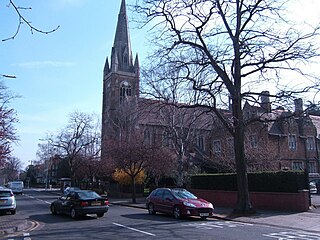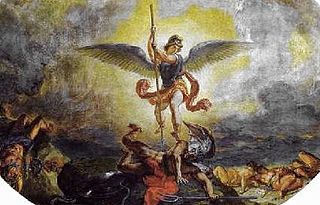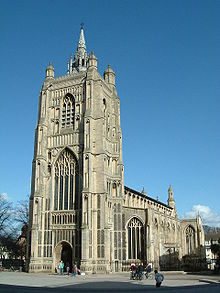
Edward Benjamin Britten, Baron Britten was an English composer, conductor, and pianist. He was a central figure of 20th-century British music, with a range of works including opera, other vocal music, orchestral and chamber pieces. His best-known works include the opera Peter Grimes (1945), the War Requiem (1962) and the orchestral showpiece The Young Person's Guide to the Orchestra (1945).
Plainsong or plainchant is a body of chants used in the liturgies of the Western Church. When referring to the term plainsong, it is those sacred pieces that are composed in Latin text. Plainsong was the exclusive form of Christian church music until the ninth century, and the introduction of polyphony.

The War Requiem, Op. 66, is a large-scale setting of the Requiem composed by Benjamin Britten mostly in 1961 and completed in January 1962. The War Requiem was performed for the consecration of the new Coventry Cathedral, which was built after the original fourteenth-century structure was destroyed in a World War II bombing raid. The traditional Latin texts are interspersed, in telling juxtaposition, with extra-liturgical poems by Wilfred Owen, written during World War I.

The Symphony No. 8 in E-flat major by Gustav Mahler is one of the largest-scale choral works in the classical concert repertoire. As it requires huge instrumental and vocal forces it is frequently called the "Symphony of a Thousand", although the work is normally presented with far fewer than a thousand performers and the composer did not sanction that name – actually, he disapproved of it. The work was composed in a single inspired burst at his Maiernigg villa in southern Austria in the summer of 1906. The last of Mahler's works that was premiered in his lifetime, the symphony was a critical and popular success when he conducted the Munich Philharmonic in its first performance, in Munich, on 12 September 1910.

Anglican church music is music that is written for Christian worship in Anglican religious services, forming part of the liturgy. It mostly consists of pieces written to be sung by a church choir, which may sing a cappella or accompanied by an organ.

Saint Nicolas, Op. 42, is a cantata with music by Benjamin Britten on a text by Eric Crozier, completed in 1948. It covers the legendary life of Saint Nicholas, Bishop of Myra, Lycia, in a dramatic sequence of events. The composer wrote the work for the centenary of Lancing College in Sussex, with the resources of the institution in mind. It is scored for mixed choir, tenor soloist, four boys singers, strings, piano duet, organ and percussion. The only professionals required are the tenor soloist, a string quintet to lead the other strings, and the percussionists. Saint Nicolas is Britten's first work for amateur musicians, and it includes congregational hymns. The premiere was the opening concert of the first Aldeburgh Festival in June 1948, with Peter Pears as the soloist.

Noye's Fludde is a one-act opera by the British composer Benjamin Britten, intended primarily for amateur performers, particularly children. First performed on 18 June 1958 at that year's Aldeburgh Festival, it is based on the 15th-century Chester "mystery" or "miracle" play which recounts the Old Testament story of Noah's Ark. Britten specified that the opera should be staged in churches or large halls, not in a theatre.

A Ceremony of Carols, Op. 28 is an extended choral composition for Christmas by Benjamin Britten scored for three-part treble chorus, solo voices, and harp. The text, structured in eleven movements, is taken from The English Galaxy of Shorter Poems, edited by Gerald Bullett. It is principally in Middle English, with some Latin and Early Modern English. It was composed in 1942 on Britten's sea voyage from the United States to England.

Hymn to St Cecilia, Op. 27 is a choral piece by Benjamin Britten (1913–1976), a setting of a poem by W. H. Auden written between 1940 and 1942. Auden's original title was "Three Songs for St. Cecilia's Day", and he later published the poem as "Anthem for St. Cecilia’s Day ".

Rejoice in the Lamb is a cantata for four soloists, SATB choir and organ composed by Benjamin Britten in 1943 and uses text from the poem Jubilate Agno by Christopher Smart (1722–1771). The poem, written while Smart was in an asylum, depicts idiosyncratic praise and worship of God by different things including animals, letters of the alphabet and musical instruments. Britten was introduced to the poem by W. H. Auden whilst visiting the United States, selecting 48 lines of the poem to set to music with the assistance of Edward Sackville-West. The cantata was commissioned by the Reverend Walter Hussey for the celebration of the 50th anniversary of the consecration of St Matthew's Church, Northampton. Critics praised the work for its uniqueness and creative handling of the text. Rejoice in the Lamb has been arranged for chorus, solos and orchestral accompaniment, and for SSAA choir and organ.

Cantata academica, Carmen basiliense, Op. 62, is a 1959 cantata by Benjamin Britten to a Latin text. It was commissioned by Paul Sacher for the quincentenary of the University of Basel. He conducted the premiere on 1 July 1960.

The Company of Heaven is a composition for soloists, speakers, choir, timpani, organ, and string orchestra by Benjamin Britten. The title refers to angels, the topic of the work, reflected in texts from the Bible and by poets. The music serves as incidental music for a mostly spoken radio feature which was first heard as a broadcast of the BBC in 1937.

The Te Deum in C is a sacred choral composition by Benjamin Britten, a setting of the Te Deum on the English text from the Book of Common Prayer. Britten wrote it between 11 July and 17 September 1934. It is scored for a treble solo, four-part choir (SATB) and organ.

The Festival Te Deum, Op. 32, a sacred choral piece by the English composer Benjamin Britten, is a setting of the Te Deum from the Book of Common Prayer. It was composed in 1944 to celebrate the centenary of St Mark's Church, Swindon, and was first performed there in 1945.
A Boy Was Born, Op. 3, is a choral composition by Benjamin Britten. Subtitled Choral variations for men's, women's and boys' voices, unaccompanied , it was originally composed from 1932 to 1933. It was first performed on 23 February 1934 as a BBC broadcast. Britten revised the work in 1955. The composer set different texts related to Christmas to music as theme and variations, scored for an a cappella choir with boys' voices.

Britten's War Requiem (1963) is the first recording of Benjamin Britten's War Requiem. It featured Galina Vishnevskaya, Dietrich Fischer-Dieskau and Peter Pears with the London Symphony Orchestra, the Melos Ensemble, The Bach Choir and the Highgate School Choir, and was conducted by Britten himself. The recording took place in the Kingsway Hall in London and was produced by John Culshaw for Decca. Within five months of its release in May 1963 it sold 200,000 copies, an unheard-of number for a piece of contemporary classical music at that time.
The Golden Vanity is a musical setting of an adaptation by Colin Graham of a traditional folk song, also known as "The Sweet Trinity", for boys' voices and piano by the English composer Benjamin Britten (1913–76). The composer described it as a vaudeville. The boys act out parts as well as sing; Britten wrote on the score: "The Vaudeville should be given in costume but without scenery ... The action ... should be mimed in a simple way and only a few basic properties, such as telescopes and a rope, are needed ... A drum should be used for the sound of cannon fire".

Children's Crusade, Op. 82, subtitled a Ballad for children's voices and orchestra is a composition by Benjamin Britten. He completed it in 1969, setting Bertolt Brecht's poem Kinderkreuzzug 1939 for children's choir with some solo parts, keyboard instruments and an array of percussion, to be performed mainly by children. It was first performed in an English version at St Paul's Cathedral in London on 19 May 1969.

Benjamin Britten's Jubilate Deo is a sacred choral setting of Psalm 100 in English, written in 1961 for St George's Chapel, Windsor Castle, "at the request of H.R.H. The Duke of Edinburgh". Britten scored the joyful music in C major for four-part choir and organ. A late companion piece to his 1934 Te Deum in C, it is also known as his Jubilate in C. It has been performed and recorded often, including on Prince Philip's 80th and 90th birthdays, and for his funeral service on 17 April 2021.













